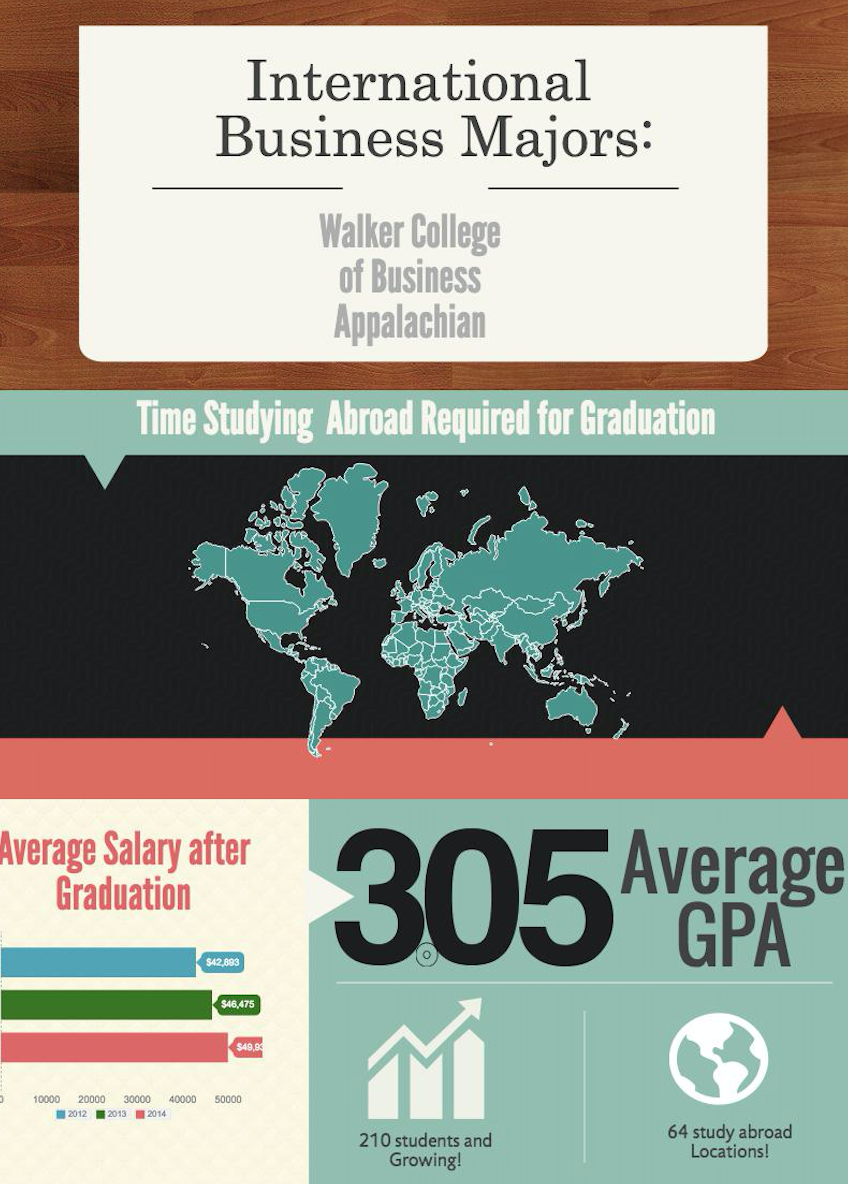Table of Contents
Understand the international business major
An international business major prepare students for careers in the global marketplace by combine traditional business principles with cross-cultural competency and international trade knowledge. This interdisciplinary field encompasses economics, finance, marketing, management, and cultural studies, create intimately round professionals capable of navigate complex international markets.

Source: business.appstate.edu
Students pursue this major develop critical skills in global communication, cross-cultural negotiation, international law, and foreign market analysis. The curriculum emphasize both theoretical knowledge and practical application, ensure graduates can adapt to diverse business environments worldwide.
Core curriculum components
The foundation of an international business program typically include fundamental business courses such as accounting, economics, statistics, and business law. Students so progress to specialized international coursework cover global marketing strategies, international finance, supply chain management, and comparative economic systems.
Language requirements form a crucial component of most programs. Students frequently must demonstrate proficiency in at least one foreign language, with popular choices include Spanish, mandarin, French, German, and Japanese. This linguistic competency proves invaluable when conduct business across cultural boundaries.
Many programs incorporate experiential learning through case studies base on real multinational corporations. Students analyze actual business scenarios, develop problem solve skills and strategic thinking abilities essential for international commerce success.

Source: haslam.utk.edu
Specialized concentrations
International business majors can oftentimes choose specialized tracks to align with their career interests. Popular concentrations include:
Global marketing:
Focus on advertising, branding, and consumer behavior across different cultures and markets. Students learn to adapt marketing strategies for diverse international audiences while consider local customs and preferences.
International finance:
Cover foreign exchange markets, international banking, and global investment strategies. This concentration prepare students for careers in multinational financial institutions and corporate treasury departments.
Supply chain management:
Emphasize logistics, procurement, and distribution networks span multiple countries. Students study trade regulations, customs procedures, and transportation systems essential for global commerce.
Emerge markets:
Concentrates on business opportunities in develop economies, include market entry strategies, risk assessment, and economic development patterns.
Essential skills’ development
International business programs cultivate diverse skill sets crucial for global career success. Cultural intelligence rank among the virtually important competencies, enable professionals to work efficaciously with colleagues and clients from different backgrounds.
Communication skills extend beyond language proficiency to include non-verbal communication, presentation abilities, and write correspondence across cultural contexts. Students learn to adapt their communication style base on cultural norms and business practices in various countries.
Analytical thinking and problem solve capabilities receive significant emphasis throughout the curriculum. Students regularly encounter complex scenarios require creative solutions that consider multiple cultural, economic, and regulatory factors simultaneously.
Technology proficiency has become progressively important as digital platforms facilitate global business operations. Students learn to leverage various software applications, data analysis tools, and communication technologies essential for modern international commerce.
Career opportunities and pathways
Graduates with international business degrees pursue diverse career paths across multiple industries. Multinational corporations actively seek professionals who understand global markets and can navigate cross-cultural business relationships efficaciously.
Export import specialist:
These professionals facilitate international trade by manage documentation, compliance requirements, and logistics coordination. They work with customs agencies, freight forwarders, and international partners to ensure smooth cross border transactions.
International marketing manager:
Responsible for develop and implement marketing strategies across multiple countries. These professionals conduct market research, adapt products for local preferences, and coordinate advertising campaigns that resonate with diverse cultural audiences.
Global supply chain coordinator:
Manage procurement, production, and distribution networks span multiple countries. They optimize logistics operations while ensure compliance with international trade regulations and quality standards.
Foreign market analyst:
Conduct research on international markets, economic trends, and competitive landscapes. These professionals provide strategic insights that guide corporate expansion decisions and investment strategies.
International banking officer:
Work with financial institutions to facilitate cross border transactions, foreign exchange operations, and international lending activities. They assess country risks and develop relationships with overseas banking partners.
Industry sectors
International business graduates find opportunities across numerous industry sectors. Manufacture companies rely on these professionals to manage global production networks and supplier relationships. Technology firms seek international business expertise to expand into new markets and navigate regulatory differences across countries.
Consulting firms value graduates who can advise clients on international expansion strategies, market entry approaches, and cross-cultural business practices. Government agencies and non-profit organizations besides employ international business professionals to manage trade relations and economic development programs.
The hospitality and tourism industry offer opportunities in international hotel chains, cruise lines, and travel companies that operate across multiple countries. These organizations need professionals who understand diverse customer preferences and regulatory requirements in different markets.
Academic prerequisites and admission requirements
Most international business programs require strong academic performance in high school, specially in mathematics, social studies, and foreign languages. Standardized test scores, letters of recommendation, and personal statements typically form part of the admission process.
Some universities prefer applicants with prior international experience, such as study abroad programs, international internships, or extensive travel. Notwithstanding, this experience is not invariably mandatory, as programs are design to develop global competency disregarding of students’ initial international exposure.
Community college transfer students can much complete prerequisite courses before enter four year international business programs. Many universities have established articulation agreements that facilitate smooth transfers for qualified students.
Study abroad and international experiences
Most international business programs powerfully encourage or require study abroad experiences. These opportunities provide firsthand exposure to different business cultures, economic systems, and market conditions that can not be replicate in classroom settings.
Popular study overseas destinations include major business centers such as London, Hong Kong, Singapore, Dubai, and Frankfurt. Students oftentimes participate in semester long programs, summer intensives, or short term business tours that combine academic coursework with corporate visits and cultural immersion.
International internships represent another valuable component of many programs. Students gain practical experience work for multinational corporations, international organizations, or foreign companies while develop professional networks that can benefit their future careers.
Some programs offer dual degree opportunities with partner universities in other countries, allow students to earn credentials from multiple institutions while experience different educational systems and business environments.
Technology integration and digital commerce
Modern international business education progressively emphasizes digital commerce and technology’s role in global trade. Students learn aboute-commercee platforms, digital marketing strategies, and online payment systems that facilitate international transactions.
Data analytics and business intelligence tools receive significant attention as companies rely on data drive decision-making for international expansion and market analysis. Students develop proficiency with various software applications use in global business operations.
Blockchain technology, cryptocurrency, and digital supply chain management represent emerge areas of study within international business programs. These technologies are reshaped how companies conduct cross border transactions and manage international partnerships.
Professional development and networking
Successful international business programs emphasize professional development through various network opportunities and industry connections. Career services departments oftentimes maintain relationships with multinational corporations, international organizations, and government agencies that recruit program graduates.
Professional organizations such as the international business honor society, world trade centers association, and various industry specific groups provide network opportunities and professional development resources for students and graduates.
Alumni networks play crucial roles in career placement and advancement. Many programs maintain active alumni associations with members work in diverse international business roles worldwide, create mentorship opportunities and job placement assistance.
Salary expectations and career progression
International business graduates typically command competitive starting salaries, with compensation vary base on location, industry, and specific role responsibilities. Entry level positions oft offer opportunities for rapid advancement as companies value professionals who can contribute to global expansion efforts.
Career progression often involve increase responsibility for larger geographic territories, more complex international partnerships, or senior management roles oversee global operations. Many graduates finally pursue advanced degrees such as MBA programs with international concentrations to enhance their career prospects.
The global nature of international business careers oftentimes provide opportunities for overseas assignments, which can importantly accelerate professional development and increase earn potential. These experiences besides contribute to personal growth and cultural competency development.
Challenges and considerations
While international business offer exciting career opportunities, students should consider several challenges associate with this field. Global business operations can involve irregular schedules, extensive travel requirements, and the need to work across multiple time zones.
Economic volatility and political instability in various regions can impact international business operations, require professionals to adapt rapidly to change circumstances and develop contingency planning skills.
The complexity of international regulations, trade agreements, and cultural differences demand continuous learning and professional development throughout one’s career. Successful international business professionals must remain current with evolve global trends and regulatory changes.
Future outlook and emerging trends
The international business field continue to evolve as globalization advances and new technologies reshape commerce patterns. Sustainability and corporate social responsibility have become progressively important considerations in international business operations.
Emerge markets continue to create new opportunities for international business professionals, peculiarly AsiasiAfricaica, aLatin Americaica. These regions offer significant growth potential but besides present unique challenges require specialized knowledge and cultural sensitivity.
Digital transformation and artificial intelligence are change how international business is conduct, create demand for professionals who can integrate traditional international business principles with modern technology solutions.
The international business major provides comprehensive preparation for careers in our interconnect global economy. Through rigorous academic study, practical experience, and cultural immersion, students develop the skills and knowledge necessary to succeed in diverse international business environments. This dynamic field offer numerous career opportunities across multiple industries while provide the flexibility to specialize in areas align with individual interests and career goals.
